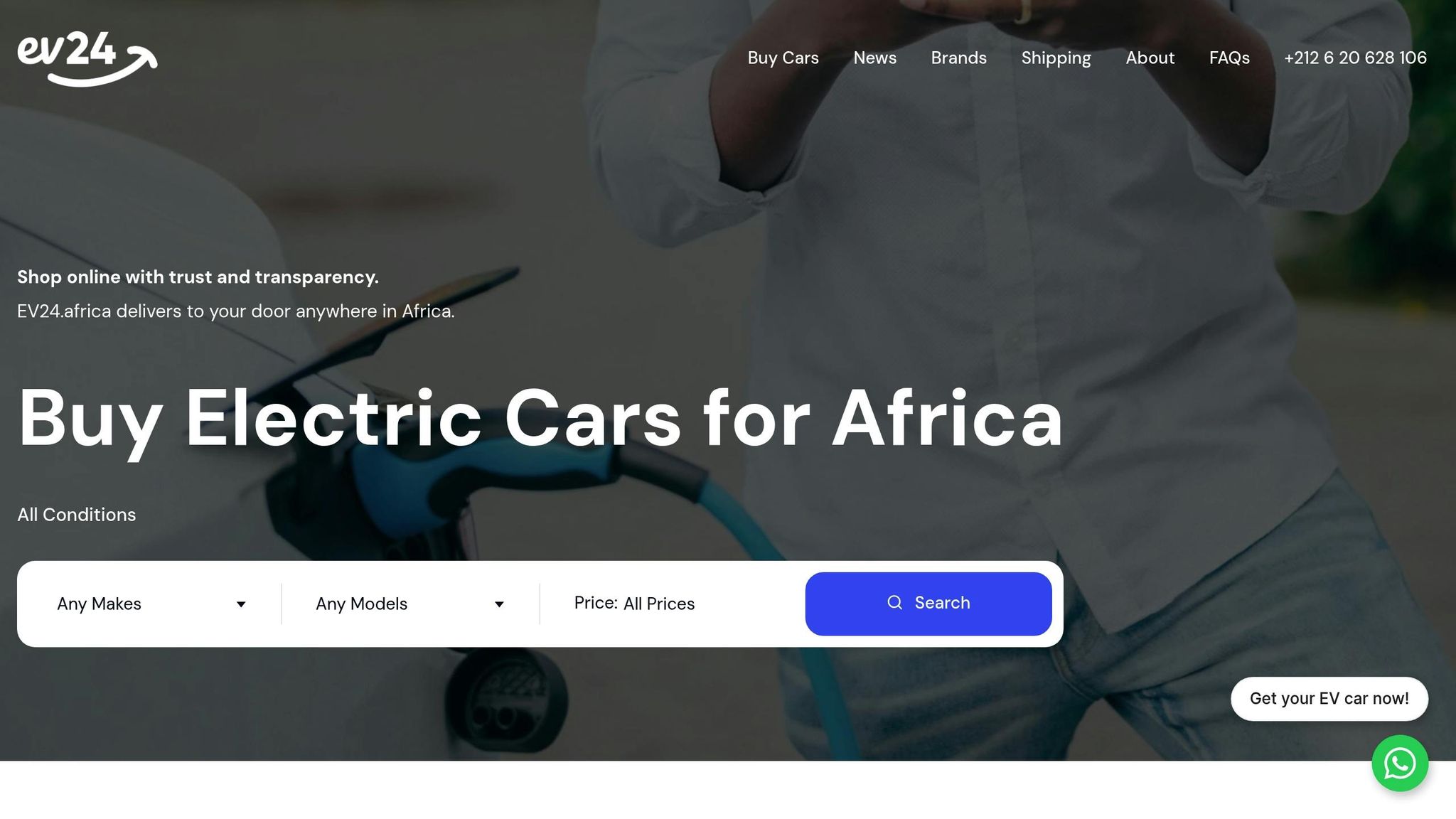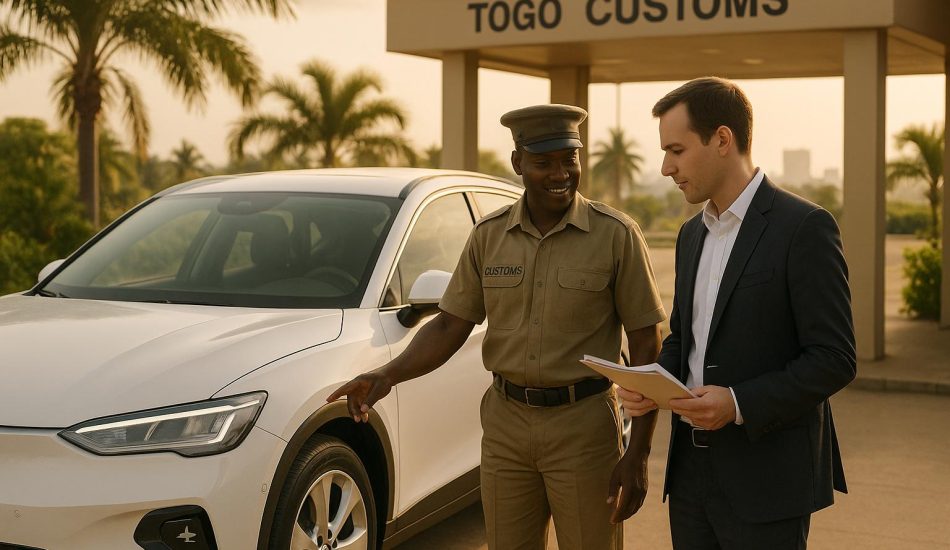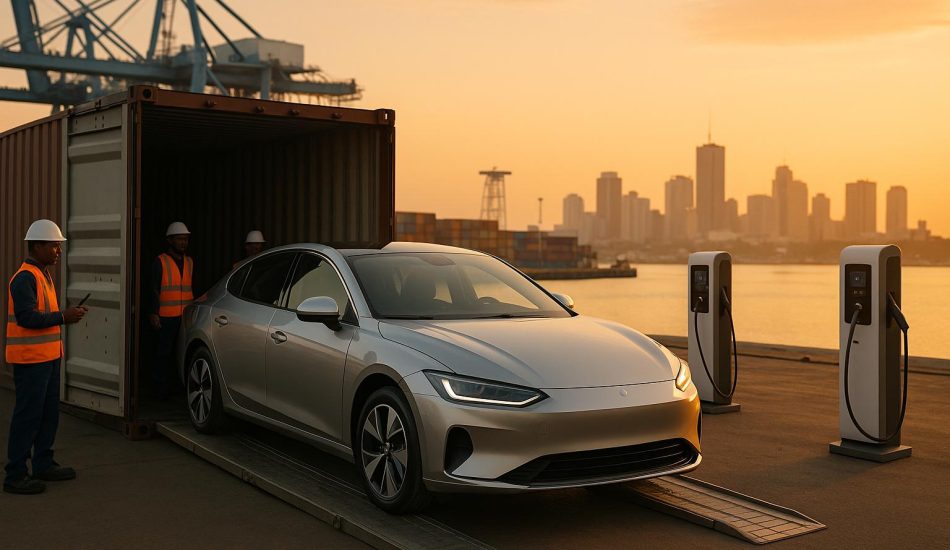
Importing electric vehicles (EVs) into Guinea in 2025 involves navigating specific rules, taxes, and documentation. Here’s what you need to know:
- Vehicle Types Allowed: Only Battery Electric Vehicles (BEVs) and Plug-in Hybrid Electric Vehicles (PHEVs) are permitted. Vehicles older than 10 years cannot be imported.
- Documentation: Key documents include an Import Permit, Demande Déscriptive d’Importation (DDI) for shipments over $1,250, and consular-legalized paperwork. EV batteries require a Material Safety Data Sheet (MSDS).
- Taxes: Import taxes can reach up to 51.9% of the CIF value (Cost, Insurance, and Freight). This includes a 10% customs duty, 12.5% VAT, and a luxury surtax (20–30%).
- Customs Process: All documents must be accurate and submitted via Guinea’s online portal. Customs clearance involves inspections of the vehicle and its battery.
- Tips: Work with experienced customs brokers, check vehicle age restrictions, and use Guinea’s One-Stop-Shop portal for smoother processing.
Proper preparation and understanding Guinea’s import requirements can help avoid delays and unexpected costs.
Guinea’s EV Import Rules and Regulations
Guinea has established specific rules for importing electric vehicles (EVs). If you’re looking to bring EVs into the country, it’s important to familiarize yourself with these regulations.
EV Types Allowed for Import
Guinea allows the import of two main types of EVs: Battery Electric Vehicles (BEVs) and Plug-in Hybrid Electric Vehicles (PHEVs).
- Battery Electric Vehicles (BEVs): These vehicles operate entirely on battery power, producing zero emissions.
- Plug-in Hybrid Electric Vehicles (PHEVs): These combine an electric motor with a traditional engine, making them a practical choice in areas where charging infrastructure may be limited.
Important: Vehicles classified as non-plug-in hybrids are not considered zero-emissions vehicles (ZEVs).
Updates for 2025
As of now, Guinea has not introduced any new policies regarding EV imports for 2025. It’s a good idea to stay informed by consulting official sources for any future updates.
Next, let’s cover the key documents required for importing EVs.
Documents You Need for EV Imports
Bringing an electric vehicle (EV) into Guinea involves navigating a detailed and strict documentation process. Missing or incorrectly prepared paperwork can lead to delays and extra fees, so getting everything right is essential.
The process involves coordination with multiple government agencies, and every document must meet specific standards. Since Guinea is not a member of the Hague Convention, you’ll need consular legalization for your documents instead of a simple apostille, which adds extra steps to the process. Below is an overview of the required documents and their purposes.
Complete Document Checklist
Before you start the import process, make sure you’ve gathered all the necessary paperwork. A key requirement is the Import Permit, which must be obtained from the Ministry of External Affairs and approved before shipping your vehicle. Without this permit, your EV cannot be imported.
For shipments exceeding a specific threshold, you’ll also need a Demande Déscriptive d’Importation (DDI) from the Ministry of Commerce. Most EV imports fall into this category, so be prepared to include this in your documentation.
Here’s what your complete document package should include:
- A copy of your passport
- The original certificate of Title and Registration
- An approved Import Permit
- A change of residence certificate
- A current Insurance Policy
- A copy of the purchase invoice
- Documents specifying the vehicle engine capacity
Each of these documents plays a role in ensuring smooth customs clearance.
Authentication is critical. All documents must be signed and notarized in person – digital signatures or electronic notarizations won’t be accepted. The authentication process involves notarization, state-level attestation, U.S. authentication, and finally, legalization at the Embassy of Guinea.
Additionally, Guinea has a strict age limit for vehicle imports: vehicles older than 10 years are not allowed, regardless of whether they are conventional or electric. Be sure to confirm your EV’s manufacturing date before proceeding.
EV Battery Documentation
Electric vehicle batteries require their own set of safety and compliance documents. One of the most important is the Material Safety Data Sheet (MSDS), which must provide detailed information about the battery.
The MSDS should include details on the battery’s chemistry, handling instructions, emergency response protocols, and compliance with safety and environmental standards. This documentation is essential for helping customs officials manage inspections and storage safely.
Since EVs use lithium-ion batteries, classified as hazardous materials for shipping, the MSDS is crucial for proving that your battery meets international safety standards and Guinea’s import regulations.
Finally, keep in mind that taxes and duties on EV imports can be as high as 51.9% of the CIF value (Cost, Insurance, and Freight). Proper documentation ensures accurate valuation and helps avoid unnecessary complications during the import process.
Import Taxes and Fees Breakdown
If you’re planning to import an electric vehicle (EV) to Guinea, it’s essential to understand the full range of taxes and fees involved. Knowing these costs upfront can help you budget accurately and prevent any unpleasant surprises when dealing with customs.
Guinea’s tax structure for imports includes several key components. First, there’s a 10% flat customs duty applied to most imports, including EVs. Additionally, a luxury surtax is levied on vehicles, typically ranging from 20% to 30% of the vehicle’s value for this category. On top of that, Guinea imposes a 12.5% value-added tax (VAT) based on the CIF (Cost, Insurance, and Freight) value of the vehicle. The country also uses the Droit Fiscal d’Importation (DFI) system, which applies duty rates between 0% and 35%, depending on the classification of the vehicle.
Tax and Duty Rates
When importing an EV into Guinea, you’ll encounter several mandatory charges. The 10% customs duty is calculated based on the declared value of the vehicle. The luxury surtax, which applies specifically to vehicles, typically falls between 20% and 30% of the vehicle’s value. Furthermore, the 12.5% VAT is applied to the vehicle’s CIF value.
It’s worth noting that, unlike some countries offering tax incentives to encourage the adoption of EVs, Guinea has not implemented any such measures. The standard tax framework remains in place for EV imports.
Beyond these taxes, importers should also account for additional service fees, such as customs broker charges, which can vary depending on the complexity of your import documentation and the broker you choose to work with.
Cost Calculation Methods
Understanding how these taxes are calculated is just as important as knowing the rates. Guinea uses the CIF method to determine the taxable value of a vehicle. This means taxes are calculated based on the total value of the vehicle, including its purchase price, shipping costs, and insurance.
For example, let’s consider an EV with a CIF value of US$30,000:
- A 10% customs duty would amount to US$3,000.
- A 25% luxury surtax would add US$7,500.
- The 12.5% VAT would contribute another US$3,750.
Altogether, these taxes total US$14,250, and that’s before factoring in broker fees or any additional charges.
Things can get even more complicated when the DFI rates come into play. Depending on the vehicle’s classification, these rates could add up to an extra 35%. To avoid surprises, it’s crucial to research these classifications and rates thoroughly.
sbb-itb-99e19e3
Customs Clearance and Vehicle Inspection
When your EV lands at Guinea’s ports, the customs clearance process kicks off. This phase is crucial – it determines whether your vehicle enters the country smoothly or gets stuck in costly delays. Customs and Border Protection officers in Guinea handle all clearance procedures, ensuring everything complies with national regulations.
The timeline for customs clearance can range from 24 hours to as long as 8 weeks. How quickly the process moves depends heavily on the accuracy of your documentation and the results of required inspections. Since September 2019, Guinea has introduced the Guichet Unique du Commerce Exterieur de Guinee, an online portal designed to simplify these procedures, improve efficiency, and reduce holdups. Here’s a breakdown of what the process involves.
Step-by-Step Customs Process
First, submit all required documentation through the online portal. Your customs declaration must be filed electronically, and every detail about your vehicle should be accurate. Errors or discrepancies in your paperwork can lead to extended inspections and delays.
Once your declaration is submitted, customs officials review the declared value of your EV. They compare it with market rates and may ask for additional documentation if they suspect undervaluation.
After value verification, you’ll need to pay all duties and fees electronically through the portal. Payments must be made to an approved bank, as only electronic transactions are accepted.
Next comes the physical inspection. Customs officers will check your EV’s Vehicle Identification Number (VIN) to ensure it matches your documentation. They’ll also confirm that the vehicle is correctly classified as electric and inspect it for any shipping-related damage that wasn’t declared.
The final step is receiving a customs clearance certificate. This certificate confirms that your EV has been legally imported and is ready for registration with Guinea’s transportation authorities.
Common causes of delays include incomplete or incorrect documentation, errors in cargo declarations, unpaid fees, or improper labeling of goods. Corruption can also be a challenge, adding further complications to the process.
EV Battery Safety Inspections
As part of customs clearance, EV batteries undergo specialized safety inspections to ensure they meet international standards. These inspections are mandatory, regardless of where your vehicle was manufactured or if it already holds certifications.
During the inspection, customs officials focus on battery leak detection. They check the battery casing for signs of electrolyte leakage, corrosion, or physical damage that may have occurred during shipping. Special attention is given to vulnerable areas like connection points and cooling systems.
Inspectors also assess the structural integrity of the battery’s mounting system and protective housing. Additionally, they examine external components of the battery management system to ensure that safety sensors and emergency disconnect systems are working as they should.
A thorough review of documentation accompanies the physical checks. Inspectors verify that the battery specifications match the technical details in your customs declaration, confirm proper hazardous materials labeling, and ensure all required safety certifications are included in your shipping paperwork.
Working with experienced customs brokers can help streamline both vehicle and battery inspections. These professionals are familiar with Guinea’s specific requirements and can assist in preparing your documentation to meet inspection standards. Local shipping agents can also be a valuable resource, helping you navigate the process and arranging secure storage if inspections take longer than expected.
Careful preparation is essential to avoid unnecessary delays during the clearance process.
Tips for Successful EV Importing
When importing electric vehicles (EVs) into Guinea, careful planning can save you both time and money while avoiding unnecessary delays. A smooth process starts with understanding the requirements of customs officials and ensuring all necessary documents are prepared before your vehicle arrives at the port. The tips below can help simplify the process and keep things running smoothly.
Best Practices for Smooth Imports
Start your paperwork early. Make sure you gather all required certificates, inspection reports, and technical specifications well ahead of shipping. This proactive approach can prevent delays at critical points in the process.
Secure import authorization in advance. If your EV’s value exceeds 12 million GNF (approximately $1,250), you’ll need formal import authorization – known as Demande Déscriptive d’Importation (DDI) – from the Ministry of Commerce before shipping.
Use an approved inspection company. If you’re importing a used EV, it must be inspected by an authorized company. You’ll need the corresponding inspection certificate when the vehicle arrives. Be sure to check the Guichet Unique du Commerce Exterieur website for the latest list of approved inspectors.
Check the vehicle’s age restrictions. Guinea prohibits the import of vehicles older than 10 years. Customs bases this restriction on the vehicle’s manufacturing date, not the model year, so double-check the production date before proceeding.
Work with experienced customs brokers. Hiring a local broker who specializes in vehicle imports can make a big difference. They understand Guinea’s specific requirements and can help expedite inspections and customs clearances.
Prepare proper battery documentation. Ensure your shipping agent correctly labels lithium-ion batteries and includes all required hazardous material classifications (UN3480/UN3481). Missing or incorrect labels can cause delays.
Leverage the online portal. The Guichet Unique du Commerce Exterieur portal is a valuable tool for managing submissions and staying organized throughout the import process.
Plan for unexpected costs. Keep supporting documents like dealer invoices and insurance appraisals on hand to justify your declared vehicle value during customs checks. This can help avoid disputes or added fees.
How EV24.africa Helps Guinea Importers

EV24.africa simplifies the entire EV import process into Guinea, offering end-to-end solutions that make importing easier and more efficient. From selecting a vehicle to final delivery, they handle every step for you.
All-in-one import management. Instead of juggling multiple parties, EV24.africa coordinates with global logistics providers, customs agents, and port authorities to ensure your vehicle moves seamlessly through each stage. They also manage Incoterms agreements, whether you prefer DDP (Delivered Duty Paid) or FOB (Free on Board).
Shipping guidance tailored to your needs. Whether you choose RoRo (Roll-on/Roll-off) or container shipping, EV24.africa helps you decide based on your vehicle type, budget, timeline, and protection preferences.
Local expertise for compliance. With a presence in Guinea, EV24.africa stays up-to-date on regulations like vehicle age limits and inspection standards. They also coordinate with authorized inspection companies to ensure your import meets all local requirements.
Transparent pricing. EV24.africa provides clear, upfront pricing that includes customs clearance, registration, and import taxes. This eliminates hidden fees and allows you to budget accurately for your import.
Real-time tracking. Stay informed about your vehicle’s location and status throughout the shipping process. You’ll also receive timely notifications for actions like document submissions or payment deadlines.
Wide vehicle selection. EV24.africa connects you to EVs from Europe, Asia, North America, and Japan, all from one platform. This makes it easier to find vehicles that meet Guinea’s import standards while staying within your budget.
In addition to these services, EV24.africa ensures efficient delivery across Guinea, primarily through the Port of Conakry, with options to transport vehicles to other locations within the country. These comprehensive solutions complement the earlier tips on documentation, taxes, and inspections, making your EV import experience as hassle-free as possible.
Summary: Your EV Import Checklist for Guinea
Bringing an electric vehicle (EV) into Guinea involves careful planning, proper documentation, and understanding the country’s customs and tax requirements.
Start by securing formal import authorization, known as DDI, from the Ministry of Commerce if the vehicle’s value exceeds 12 million GNF (approximately $1,250). For used EVs, you’ll also need an inspection certificate from an approved inspection agency before shipping.
Once your paperwork is in order, get familiar with Guinea’s tax structure. Import duties can reach up to 35%, though most EVs fall under a flat 10% tariff. Additionally, a vehicle surtax of 20–30% applies. These taxes are calculated using the CIF method, which factors in the vehicle’s value along with shipping costs. Don’t forget to account for customs brokerage fees in your budget.
To make customs clearance easier, use Guinea’s One-Stop-Shop platform, the Guichet Unique du Commerce Exterieur. Partnering with experienced local customs brokers can also save time and reduce hassles.
For a smooth import experience, consider utilizing EV24.africa. Their platform offers a wide selection of EVs, clear pricing, and tools to help you navigate Guinea’s import process. With thorough preparation and accurate documentation, you’ll be well-equipped to complete your EV import successfully.
FAQs
What steps do I need to follow to get an import permit for EVs in Guinea by 2025?
To bring an electric vehicle (EV) into Guinea legally in 2025, you’ll need to secure an Import Authorization, officially referred to as the Demande Déscriptive d’Importation (DDI), from the Ministry of Commerce. This document confirms that your EV complies with Guinea’s import regulations.
Here’s what the process looks like:
- Required Documentation: You’ll need to provide specific details about the EV, proof that it meets Guinea’s standards, and ownership records.
- Age Limit: The vehicle must not be older than five years.
- Taxes and Fees: Be prepared to pay any required taxes and fees associated with the import process.
Once your application is approved, the authorization allows you to move forward with customs clearance and other necessary regulatory procedures to finalize the import.
What steps should I take to ensure my EV’s battery meets Guinea’s import safety standards?
To ensure your EV’s battery aligns with Guinea’s safety requirements, it’s important to follow established international safety standards. For example, the GB 38031-2025 standard mandates that lithium-ion batteries must withstand fire or explosions, even in cases of thermal runaway or physical damage. Similarly, adherence to ISO 12405 standards for performance and safety testing is essential.
Make sure to fully document your battery’s compliance with these standards and include the necessary certifications when preparing for import. This will streamline customs clearance and ensure your EV meets Guinea’s regulations for imports by 2025.
Will there be any tax incentives or exemptions for importing electric vehicles into Guinea by 2025?
As it stands, Guinea does not provide any tax breaks or exemptions for importing electric vehicles (EVs). Importers currently face standard import duties and taxes, as there are no specific benefits like reduced tariffs or tax credits tailored for EVs in 2025.
That said, with the global push toward greater EV adoption, Guinea might consider introducing such incentives down the road. For now, though, anyone importing EVs into the country should budget for the usual customs and tax obligations.




